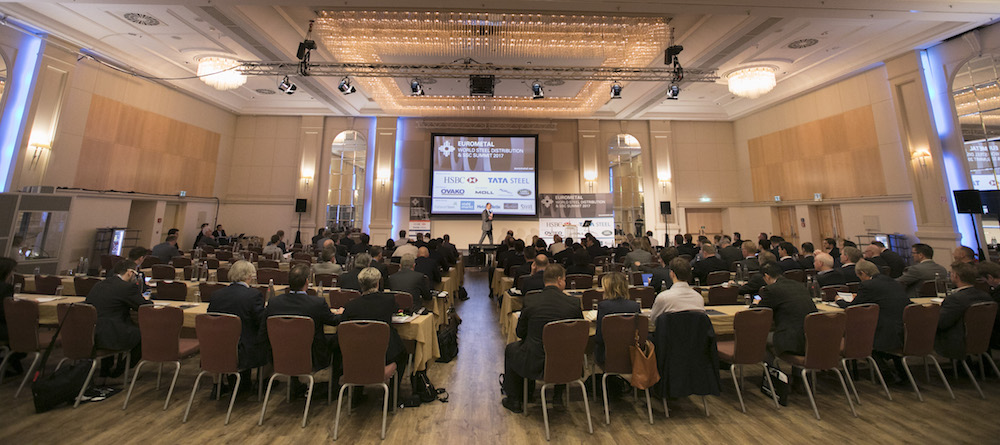
EC may have cut countries from ADD investigation: sources
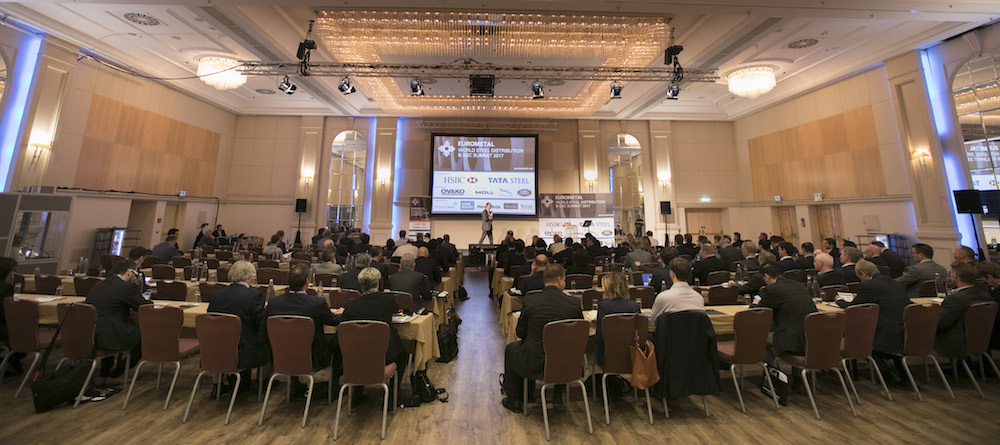
Serbia and Iran may have been removed from the European Commission’s investigation into hot rolled coil imports, according to sources attending the EUROMETAL Summit in Dusseldorf.
“The investigation is still ongoing. No decisions have been taken at this stage, so no comment from us at this point in time,” Kinga Malinowska, Press Officer for Trade at the European Commission, told S&P Global Platts via email Thursday.
Charles de Lusignan, Communications Manager at European steel producers’ association Eurofer, said the organization heard that Serbia could have been excluded, but had nothing to suggest this was the case for Iran.
When the European Commission said earlier this year it would not impose preliminary duties on imports from Brazil, Iran, Serbia, Russia and Ukraine, it said Serbia should not be cumulatively assessed with the other four countries: it was barely over the minimum market share threshold, at 1.04%, and average selling prices were considerably above the other countries in the investigation period, the commission said.
“It follows that protective measures are unnecessary with regard to the imports of HRF originating in Serbia,” the commission document, seen by Platts, said. At the time the commission also refused to comment on whether this meant Serbia had been excluded.
One legal source said Thursday it was evident from that document Serbia would be removed from the case. He also said the deadline for announcing definitive dumping duties could have been brought forward from October to August, though this could not be confirmed.
Serbia being removed from the case may have raised some eyebrows, as Chinese-owned mill HeSteel is said to be the most competitive player in the European market of late: recent offers have been heard at €470/mt delivered into south Germany and €485/mt delivered Ruhr, both of which are way below the €530-€540/mt ex-Ruhr level being quoted by western European mills.
Nevertheless, sources noted Serbia is a small player with limited volume impact, and many were surprised it was even named in the dumping investigation.
Most point to the reappearance of significant volumes of Russian HRC in the Antwerp import market as a more significant result of the European Commission’s decision not to impose preliminary anti-dumping duties. When announcing it would not impose duties, the EC said duties could have harmed end-users, as reported.
Peter Brennan, Annalisa Villa and Colin Richardson, S&P Global Platts
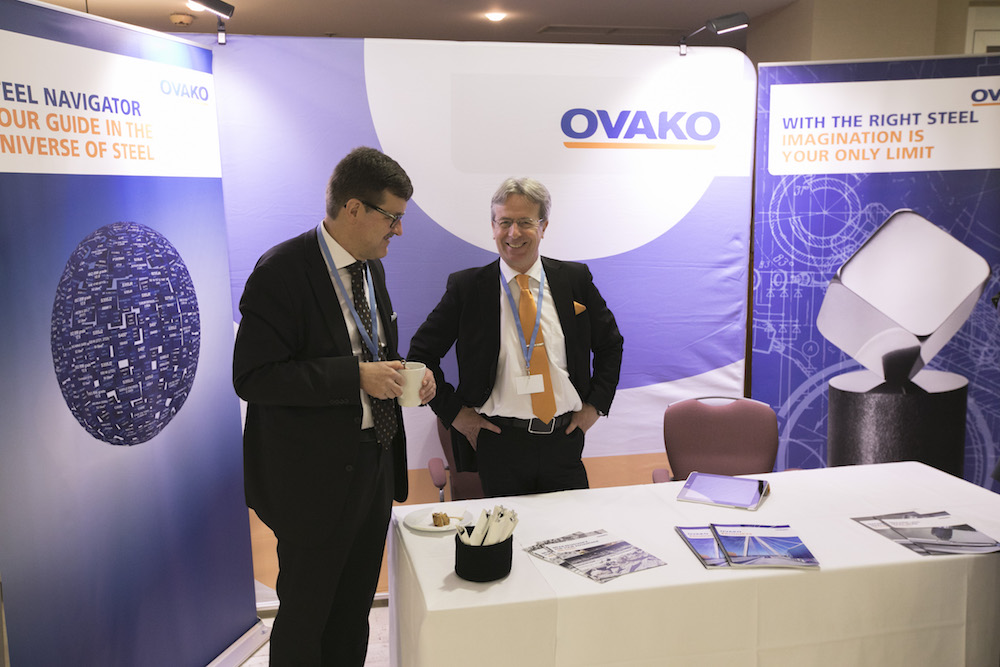
Ovako promotes machinable steels to distribution sector
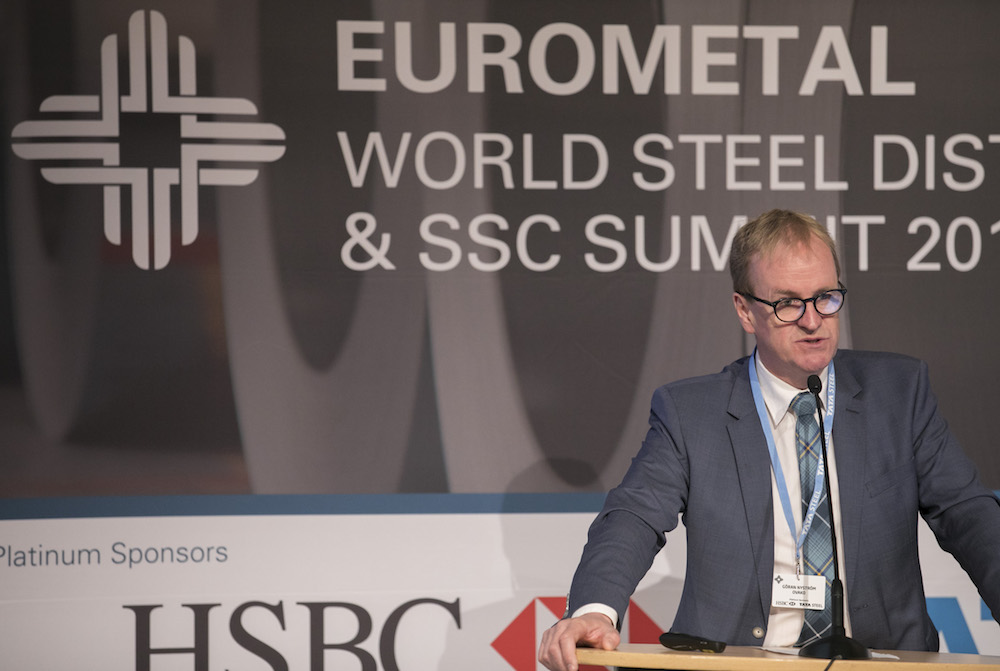
Ovako is promoting its steel treatment technology for improved machinability as an example of an opportunity for distributors to participate in the value-added chain from an early stage.
The philosophy of the Swedish engineering steels producer was delivered by vice executive president and head of group marketing, Göran Nyström, at the recent EUROMETAL World Steel Summit in Düsseldorf, attended by Kallanish. Ovako continues to sell 85% of its production to end-users, “… but we would like to change that,” Nyström told the audience of mainly distributor and service centre managers.
Ovako faces the difficulty of having to service a wide range of customers with very different requirements for the special steels produced by the company. Such a delivery challenge for a mill “… brings opportunities for you distributors [… to act] as a buffer,” he said.
Nyström highlighted the role of Ovako’s M-Steel (M for ‘machinable’) as an example of [… potential] closer cooperation with distributors. The basis for the M-Steel concept is that non-metallic inclusions in steel are modified and controlled with calcium treatment. These inclusions are modified in a way to maximise machinability and to improve transverse fatigue strength. In this way, a protective layer is formed on the cutting tool during machining that very significantly reduces the wear on the tool and increases tool life.
The M-Steel concept allows 30% faster throughput for machined components, and can extend cutting tool life by 50%. “Tool suppliers are not keen to promote us, it takes half of their market,” Nyström quipped, and closed with the remark that “… we need distribution services to bring this innovation outside the Nordic region.”
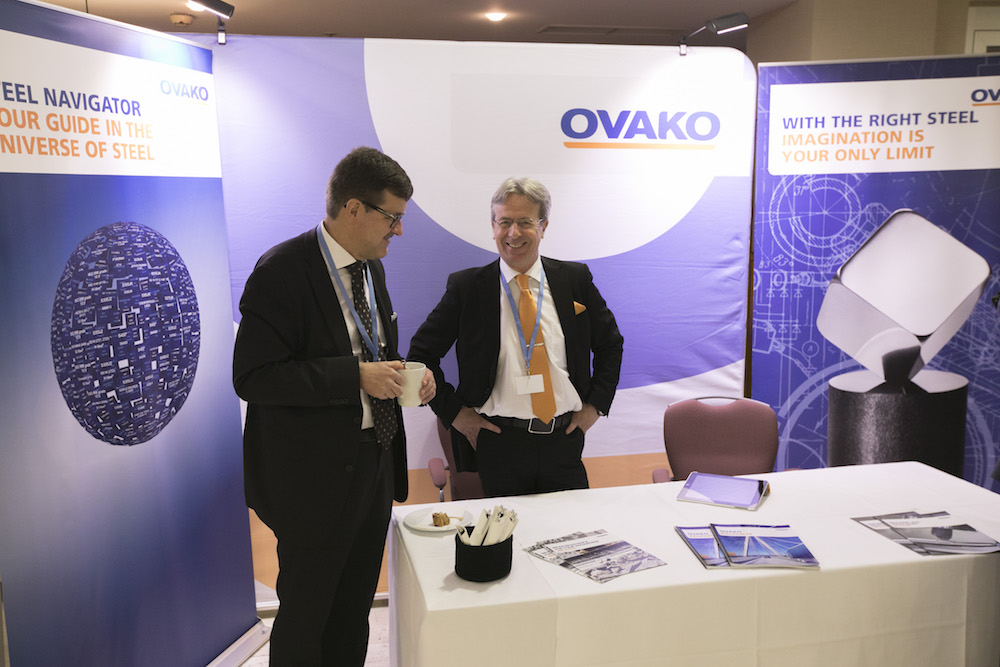

Die globale Entwicklung des Stahlhandels
Die Tagung, die der europäische Verband für die Distribution von Stahl, Rohr und Metall, EUROMETAL, vom 10. bis 12.5. veranstaltet, soll alle Beteiligten an einen Tisch bringen: Stahlkunden und -händler, Stahl-Service-Center, Stahlerzeuger und -weiterverarbeiter sowie Logistiker, Finanziers, Risikomanagement und Softwarelieferanten.
Beleuchtet werden in der dreitägigen Konferenz die Herausforderungen, Risiken und Chancen der globalen Stahldistribution wie Überkapazitäten und -angebote, steigende Handelsbeschränkungen etc. Namhafte Referenten sind in Düsseldorf zu Gast, um ihre kompetenten Einschätzungen abzugeben. Zahlreiche Vorträge sind am zweiten Konferenztag geplant: Neben den Handelsbeschränkungen und deren Auswirkungen auf den Stahlhandel referieren die Teilnehmer über die verschiedensten Geschäftsmodelle, mit denen sich der Stahlhandel in aller Welt beschäftigt. Außerdem stehen Sicherheits- und Gesundheitsaspekte ebenso auf der Agenda wie Preisfindung für Dienstleistungen und die Digitalisierung in den Unternehmen.
Mit der Besichtigung einer der Marktführer für kaltgewalzte und galvanisch veredelte Stahlbänder, der Tata Steel Hille & Müller in Düsseldorf, endet die Veranstaltung am dritten Konferenztag.
http://eurometal.net/summit2017/

Euro zone manufacturing PMI hits six-year high

Manufacturing continued to strengthen in April with the flash Markit Purchasing Managers’ Index for the euro zone reaching 56.8, as output, new orders and employment all rose at the quickest rate in six years.
Steel demand has been slow and steady of late with service centers not active in the booming automotive sector noting the tendency of end-users to hold off from purchasing. However, it would appear that the wider manufacturing sector is going from strength to strength which should indicate demand for steel will improve.
At 56.8 the index was up on the 56.2 recorded in March despite input prices remaining elevated. Markit noted growth in all of the monitored countries except Greece (48.2). Germany recorded the strongest growth with its PMI of 58.2 well in excess of the 50 mark of stability. Austria (58.1), Netherlands (57.8), Italy (56.2), France (55.1), Ireland (55.0) and Spain (54.5) also achieved good results.
“Companies are benefitting from the historically weak euro, improved growth in key export markets, rising domestic demand and ongoing central bank stimulus including record-low interest rates,” according to Chris Williamson, economist at IHS Markit.
Brexit also appears not to have had a huge impact in the UK where the manufacturing PMI of 57.3 was a three-year high. The stronger global market conditions, combined with a significantly devalued sterling, continued to benefit exports, while manufacturers have seemingly been able to pass on increased input costs to their customers.
Peter Brennan, PLATTS

Stahlo expands slitting capacity to 300,000 mt/y in Gera

German independent steel service center Stahlo is expanding its Gera-based facility and will double its slitting capacity to 300,000 mt/y, the company said in a note on its website.
Stahlo, which is part of the Friedhelm Loh Group, will invest €45 million in a new 22,000 square meter production hall and has bought additional land neighboring its existing Gera site which opened in 2004.
With an additional slitter, the site will be able to slit up to 60 strips in one step with a tear strength of 1,900 Newton per square millimeter. Stahlo will also process aluminum with an additional contour cutting line in future. The planned opening is scheduled for early 2019.
The expansion also involves creation of a direct railway connection. “We are almost exclusively shipping our outgoing goods via truck, but in future we want to handle up to 80% of incoming goods via rail,” said managing director Guido Spenrath.
The Gera site caters primarily for the automotive industry and auto suppliers such as VW in Zwickau as well as the white goods industry. Stahlo’s portfolio ranges from slitted coils, cut-to-size sheets, standard sheets, blanks and contoured blanks.
Laura Varriale, PLATTS

Worldsteel Construction Conference 2017

Improving collaboration within and across regions
29 May – 1 June 2017
Maritim Hotel, Düsseldorf
Maritim-Platz 1
40474 Düsseldorf
Germany

thyssenkrupp offers manganese boron steels as blanks
Sheet processors which hot-form components can now order certain input material as blanks from thyssenkrupp Steel, Kallanish understands from a press release.
From its Duisburg steelmaking operations, tk Steel delivers manganese boron steel as blanks in the shape ordered by the customers. “There has been a high demand for this service; it is attractive for the carmakers as well as for their suppliers,” says Matthias Berens, product manager at tk Steel Europe. It saves customers one processing step as well as the disposal of scrap that normally accrues in the process, he explains.
In this service tk Steel is working together with the group’s distribution unit thyssenkrupp Schulte, which specialises in serving supply chains. tk Steel delivers the steel as coil to tk Schulte, which takes over the further cutting, shaping, logistics, and the recycling of scrap. The company did not confirm whether the service is confined only to manganese boron steels.
This type of steel offer high strength with good formability, the steelmaker says on its website. This enables weight savings in the use of strength-relevant structural and safety components in the automotive industry. Typical applications for manganese boron steels include bumper bars, side impact intrusion beams, pillars or body reinforcements.


